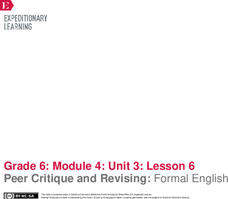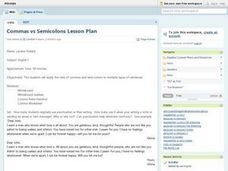Curated OER
Formal versus Informal Language
Engage in an activity that focuses on the concepts of formal and informal language use. Middle and high schoolers compare and contrast each style by using a Venn diagram that includes some examples. They read and hear a passage of lyrics...
Curated OER
Formal and Informal Language
“C u l8r @ skool.” As part of a study of formal and informal language, class members examine excerpts from Lil’ Boosie lyrics, the Emancipation Proclamation, a speech by Martin Luther King. Links to the resources not provided; however,...
EngageNY
Peer Critique and Revising: Formal English
Dear Sir or Madam: What's the difference between formal and informal language? Scholars focus on using formal English and transitions in their position papers. After revising their rough drafts, they engage in the peer editing process...
Curated OER
Formal VS. Informal
Students each get a copy of the "Formal vs. Informal" task sheet. They read the sentences twice and students put a check mark in the appropriate column on the task sheet. Students explain orally why the form of address is formal or...
Curated OER
Writing Formal Letters
Help your young writers recognize the importance of composing formal letters. Middle schoolers read letters written by Thomas Jefferson and analyze the components that make it a formal letter. They will then compose their own...
Virginia Department of Education
Determining Purpose and Audience
Build the writing skills of your junior high wordsmiths with activities that introduce many essential skills of writing. As a class, they develop working definitions of formal vs. informal writing, explore different categories of...
Curated OER
Languages in Contact, Socio-spatial Diversity: Language Varieties
Spend some time considering the functions and types of language such as vernacular, standard, and pidgin. This lengthy presentation would benefit a college-level linguistics course with its accurate descriptions and plenty of examples....
Curated OER
Commas vs. Semicolons Lesson Plan
Ninth graders use correct punctuation when writing. After defining the use of commas and semicolons, they discuss how punctuation can help eliminate confusion. They listen to a letter, first with correct punctuation, and then without...
Curated OER
MLA Documentation & Style
The format of a formal paper, according to the Modern Language Association (MLA) Style Guide, is the focus of a text-heavy presentation that cites the rules but offers few examples. Consider adding additional slides or including a...
Curated OER
Parts of Speech
This online multiple choice quiz focuses on upper-level grammar concepts. In addition to covering simple parts of speech such as nouns, verbs, and adjectives, this resource also covers more advanced information, such as transitive vs....
Curated OER
Parts of Speech
Review advanced grammar concepts with this standard online interactive multiple choice quiz. Young grammarians must know simple grammar principles such as verbs, prepositions and adverbs as well as higher-level knowledge like passive vs....
Curated OER
Identifying Science Fiction
High schoolers discuss works of science fiction that they read, highlight aspects that made each a part of science fiction genre, identify formal literary elements, and discuss ways each can be developed through science fiction.
Curated OER
An Exploration of Automotive Design
students research varied aspects of car design, and create a new design for the exterior body of a car. Students conduct Internet research, respond to writing prompts, and analyze, evaluate and synthesize information from multiple...
Curated OER
Satire
Learners will greet the world with a more critical eye after examining the forms, functions, and varying degrees of satire in this presentation. Defining satire as a whole, as well as identifying examples of different forms of satire in...
Curated OER
Connecting the Dots: Workers and Their Importance
Students explore the role of workers and their jobs in the community. They write a friendly letter to a community worker expressing appreciation for the work they do and their importance to the community.
Curated OER
Verbs and Adverbs
Students identify the verbs, nouns and pronouns in a groups of sentences . As a class, they discuss the importance of verbs and discover the function of adverbs. To end the lesson, they examine the difference between adjectives and...
Curated OER
Pumpkin Writing Paper
In this writing worksheet, students use the blank lined paper with a colorful pumpkin border for any kind of writing: reports, poetry, stories or letters.
Curated OER
Getting Dressed For Success
Learners in an ESL classroom describe and identify different clothing items. In groups, they compare and contrast the various clothing tradtions found in each home country. They discuss the importance of clothing and how they should...
Other
Match the Memory: Formal vs Informal Language
Match the Memory Interactive game where players match a word to either formal or informal language.
Department of Defense
Do Dea: Conventions
Sharpen your use of the formal conventions of English with this self-guided learning module. The module focuses on formal and informal language, making pronouns agree with their antecedents, and common spelling and grammar errors. At the...
Grammarly
Grammarly Blog: Anytime vs. Any Time
This page focuses on changes in language usage pertaining to "anytime" and "any time." In informal writing "anytime" can be used, but in formal writing "any time" is perferable. Examples are provided.
Grammarly
Grammarly Blog: Anyway, Anyways, or Any Way
This page focuses on formal and informal use of "anyway," anyways," and "any way." Anyways is very infomal and should not be used; "anyway" is correct to mean "in case of" and "any way" should be used for all other situations. Examples...
Grammarly
Grammarly Blog: Anymore vs. Any More
This page explains the use of "anymore" in informal writing, but in formal writing and anywhere else, "any more" is preferable. Examples are provided.
English Worksheets Land
English Worksheets Land: Informal vs. Formal Uses of English Worksheets
Language is seen as coming in two basic forms - formal and informal. These worksheets will help students identify the different uses of language.

























